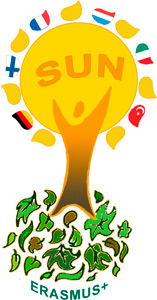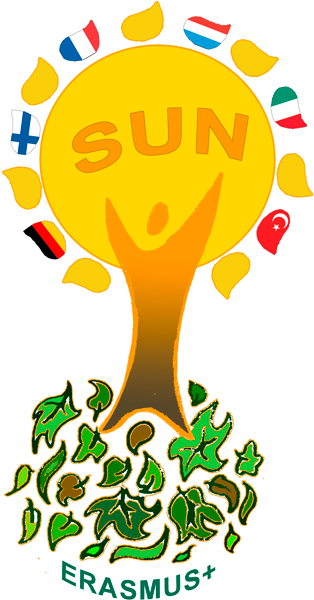Am Kader vum Projet Erasmus+ « There is something new under the sun » si mir fir eist 3. Treffen op Istanbul an d’Türkei gereest. D’Ziler vun dësem Treffen tëscht alle Partnerlänner waren eise Schüler aus dem Régime préparatoire Noémie Dias Semedo, Felismina Jacinto Ferreira, Miguel Gonçalves Matias, Hamdija Kuc zesumme mat hiren Enseignanten, Lydie Gaspar a Charles Biver, en Abléck an eng friem Kultur ze ginn, d’Stad Istanbul ze entdecken esou wéi den Alldag an enger friemer Schoul a Famill mat ze erliewen an ze deelen.
D’Schüler waren a de Familjen vun hiren türkesche Korrespondenten ënnerbruet an hunn den Dag iwwer an der Schoul um regulären Unterrecht am Däitschen an Engleschen Deel gehol. Si haten als Aufgab a Gruppen an der Physik a Geografie d’Phänomen Dag a Nuecht duer ze stellen an dobaussen am Schoulhaff gemeinsam mat hire Partner eng Sonnenauer ze bauen. An de Sproochen hu si e Video-Dictionnaire ronderëm d’Sonn erstallt.
Zesumme mat deenen aneren Austauschschüler an hire Korrespondenten hunn eis Schüler awer och d’Land, d’Kichen a Gewunnegten entdeckt, de Miniaturk Park besicht, op der Universitéit « Istanbul Aydin University » de Bau vu Solarautoen ekläert kruet, d’Aalstad Istanbul mat de ville Museeën, Moscheeën, Monumenter a Bazar entdeckt an eng Bootstour um Bosporus mat Ofschlossiesse gemat.
D’Enseignanten hirersäits hu sech all Dag an der Schoul getraff, fir de Bilan ze man, gemeinsam festzehale wat opsteet a nach gemat muss ginn, um Unterrecht Deel ze huelen an zesumme mat de Schüler als Ofschloss d’Stad Istanbul ze entdecken.
D’Schoul Doğa Koleji ass eng Privatschoul fir Kanner am Alter tëscht 3 a 17 Joer. Dëser Schoule ginn et ongeféier 100 an der Türkei dovunner aleng ëm déi 40 zu Istanbul. Doğa heescht Natur an eent vun den Ziler vun dëser Schoul ass et d’Natur an Ëmwelt de Schüler vu Klengem u méi no ze bréngen. E weidert d’Zil sinn d’Erléiere vun de Sproochen. Vun der Spillschoul u léieren d’Kanner Englesch. Däitsch kënnt an der Grondschoul bäi.
Wann Dir wëllt méi iwwer eis Partnerschoul Campus Beykent Doğa Koleji gewuer ginn, luede mir Iech häerzlechst an eisen Interview nozeliesen, dee mir mat dem türkesche Koordinator Ali Batuhan Bardakçi gefouert hunn.
D’Fotoen zu eisem Openthalt kënnt Dir Iech och gären ukucken ënner dem Link :http://flipagram.com/f/e1JlwPm5TB
Interview with Ali Batuhan Bardakçi:
1. Does the school have a specific focus? Does your school have a particular educational philosophy ?
The main focus of the school is to graduate students who are good in English, enterprising, social, solution oriented and skilled in business administration. We follow three different dimensions of educational systems such as CEF (Common European Framework) for language classes, curriculum of Turkish National Ministry of Education for core curriculum and MBA model for business classes.
2. Which level is required to enter your school?
The students should have graduated from secondary school in order to apply our school. And secondary school finishes normally when the pupils are in the age of 13 – 14 after one year of kindergarten, 4 years of elementary school and 4 years of secondary schools.
3. What is your highest level of education? How old are your students then?
We graduate students after they completed 12th grade at the age of 17 – 18. The education in our school takes 4 years and after they completed this education they have an access to apply for university entrance exam.
4. When do classes begin and finish?
Classes begin at 08.50am and finish at 16.00pm.
5. How much time do students typically spend on homework? How much homework do students have?
Each class has 5 performance homeworks in a term. In addition to performance homeworks, there are also 4 more vocabulary and writing homeworks that are given to the students during the term. They spend a time between 1 hour and 2 hours for each homework.
6. What is the average class size ?
The average class size is 14 students for each class.
7. What is this school’s approach to student discipline ?
All students wear a school uniform. They must not smoke in the school. They have to be silent during the lessons. They have to do their homework on time. They have to respect all the teachers. It is forbidden to wear make-up.
8. How is technology used to support teaching and learning at this school? What kind of technology and software students use?
We have smart boards in all classrooms. We have e-books. We have a portal to keep in touch with the students and their parents.
9. How do students get to school? Is free school busing available?
Free school busing is not avaliable. Students have to pay for the school buses or they come to school with their parents or on their own.
10. Does the school offer tutoring or other support if students need extra help?
The school doesn’t offer a special tutoring to students who need extra help but students are always welcomed and encouraged to ask questions to their teachers after school. Also the 11th and 12th grades come to school every Saturday for 6 hours of study. They review the week’s lessons and take tests since they are getting prepared for the University Entrance Exam.
11. What activities are offered to students?
Doğa Schools have a tight schedule in terms of its activities. One of the most significant activities is d’MUN, in which students role-play delegates to the United Nations and simulate UN committees. Hundreds of high school students around the country attend the d’MUN, which takes place several times each year and the students do everything in English. This Model United Nations activity involves substantial researching, public speaking, debating, and writing skills, as well as critical thinking, teamwork, and leadership abilities. While discussing issues like racism and immigration and trying to find solutions to the problems, d’MUN helps students improve their English while having fun with their friends.
Teens Talk is an activity that lets students express their ideas and thoughts about topics that they choose. It allows them to improve their public speaking abilities and gain self-confidence.
D’Pals (Peer Assisted Learners) is a project that allows students to discuss issues like human rights, active citizenship or gender equality with the peer assisted learning method.
Talent Show is another activity that takes place at Doğa Schools. Students show their abilities in dancing, singing or in other areas and present their show to other students at their school. Short film activities, mini debates and job interview simulations are some of the other activities that students can participate. Other than these, Doğa Schools have basketball, football and other sports teams that students can be a part of.
12. Where do students go after they graduate?
Our students have to enter the national university entrance examination after they graduate from our school. If they succeed, they continue with their studies at a university. Universities in Turkey provide either two or four years of education. Some universities also ask for an additional year of English preparoty study to be completed before the start of studies.There are 167 universities in Turkey, which consist of as either public or private. There are many departments at these universities such as engineering, architecture, science, literature, medical, economy, law, arts, sports and education. Each university determines different scores for the national university entrance examination.
13. What percentage of students will study abroad?
There are 200 students in our school and ten of them will study abroad. Therefore, we can say that 5% of our students will study abroad.
We thank Ali Batuhan Bardakçi very much for this talk.
 Quelle:http://www.ltb.lu/actualites/erasmus-theres-something-new-under-the-sun-turkey/
Quelle:http://www.ltb.lu/actualites/erasmus-theres-something-new-under-the-sun-turkey/


